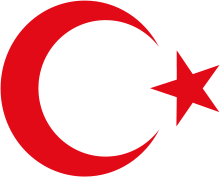Turkey–United Kingdom relations
 | |
Turkey |
United Kingdom |
|---|---|
Turkish–British relations are foreign relations between the Republic of Turkey and the United Kingdom. The two nations have been at war several times, such as within the First World War. They have also been allied several times, however, such as in the Crimean War. Both countries currently maintain relations via the British Embassy in Ankara[1] and the Turkish Embassy in London.[2]
Turkey and the United Kingdom maintain good bilateral relations.[3] The President of Turkey Cevdet Sunay paid a state visit to the United Kingdom in November 1967.[4] The President of Turkey Kenan Evren paid a state visit to the United Kingdom in July 1988.[4] HM Queen Elizabeth II of the United Kingdom paid state visits to Turkey in October 1971, and in May 2008.[5] Britain and Turkey are both members of the G20, and Britain supports the accession of Turkey to the European Union.
Mandate of Palestine


The Ottoman Empire, of which Palestine was a part, broke up shortly after the First World War and was officially dissolved in 1923 by the Treaty of Lausanne. Palestine was previously a part of the Ottoman Empire. Britain had declared its intention to support the creation of a Jewish "homeland" in the Balfour Declaration, 1917. Note the declaration deliberately did not use the word 'state' preferring and concluding on the word 'homeland'. The British had, in the Hussein-McMahon Correspondence, previously been in discussions with the Hashemite family concerning the concept of an independent Arab state. These discussions remained inconclusive and vague but contained the implied support from Britain of an independent Arab state in exchange for a successful Arab Revolt during World War I. The British, under General Allenby during the Arab Revolt under the guidance of British intelligence officers, the most famous being T. E. Lawrence, contributed to the defeat of the Ottoman forces in 1917 in which British and French forces occupied the Sinai and the majority of Greater Syria. The land was administered by the British for the remainder of the war.
Cyprus dispute
The Ottoman Empire leased the island of Cyprus to the United Kingdom in 1878. The UK formally annexed Cyprus as a British colony in 1914 at the outset of the Great War. Britain maintained two sovereign military base areas on the island of Cyprus after the country's independence in 1960, after over 400 British men, women were killed by the EOKA.[6] As a result of the Nikos Sampson coup in Cyprus supported by the military regime of Athens and the aggravation of EOKA-B atrocities over the Turkish Cypriots from 1963-1974 Turkey intervened in the Northern part of the Island in 1974, as a Guarantor Power. In 1983, Turkish Cypriots declared the independent Turkish Republic of Northern Cyprus. The United Kingdom does not recognise the TRNC which is only recognised by Turkey. The UK is a signatory to the Treaty of Guarantee, together with Greece and Turkey concerning the independence and status of Cyprus.[7]
Trade
The United Kingdom is the second biggest importer of goods from Turkey, after Germany. Turkey exports around 8% of its total goods to the United Kingdom.[8] Around 2,000,000 Britons take holidays in Turkey every year, while 100,000 Turks travel to the UK for business or pleasure.
See also
References
- ↑ "Welcome to the British Embassy Turkey" britishembassy.gov.uk Link accessed 29 May 2008
- ↑ "Welcome to Turkey" turkey.embassyhomepage.com Link accessed 29 May 2008
- ↑ "Bilateral Relations" britishembassy.gov.uk Link accessed 29 May 2008
- ↑ 4.0 4.1 "Ceremonies: State visits". Official web site of the British Monarchy. Retrieved 26 November 2008.
- ↑ "OUTWARD STATE VISITS MADE BY THE QUEEN SINCE 1952". Official web site of the British Monarchy. Retrieved 26 November 2008.
- ↑ http://www.amazon.co.uk/Genocide-Files-Harry-Scott-Gibbons/dp/0951446428
- ↑ http://www.sba.mod.uk
- ↑ "World Fact Book - Turkey" cia.gov Link accessed 29 May 2008
External links
- Turkish Ministry of Foreign Affairs about relations with the United Kingdom
- "Coming war against Iran: Increasing Anglo-American pressure on Turkey". Global Research. 21 June 2008.
| ||||||||||||||||||||||||||||||||
| |||||||||||||||||||||||||||||||

